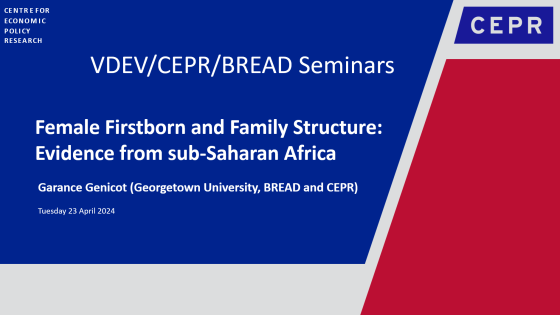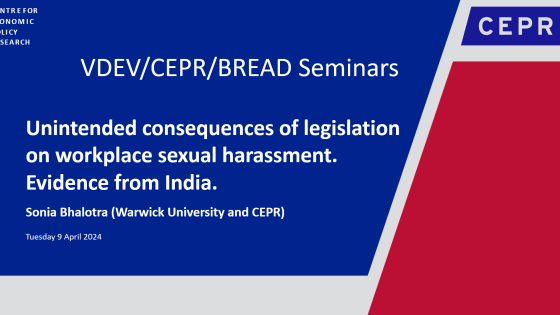Differences in per capita income have received considerable attention in the oratory on civil wars. The UN Millennium Project, Investing in Development: Practical Plans to Achieve the Millennium Development Goals (2005) notes, for example:
“Poor and hungry societies are much more likely than high-income societies to fall into conflict over scarce vital resources, such as watering holes and arable land… Poverty increases the risks of conflict through multiple paths” (page 6). “The implications are twofold: Investing in development is especially important to reduce the probability of conflict” (page 8).
Progress in stopping war, civil conflict, and violence - the argument goes - requires a reduction in poverty. For example, German Chancellor Schröder stated in 2001: “Extreme poverty, growing inequality between countries, but also within countries themselves, are great challenges of our times, because they are a breeding ground for instability and conflict. So reducing worldwide poverty is, not least, essential to safeguarding peace and security.”
This “stylised fact,” that poverty breeds conflict and war, is supported by two empirical papers. Fearon and Laitin (2003) find that lower income per capita increases the likelihood of civil war. They argue that income per capita is a proxy for the state’s overall financial, administrative, police, and military capabilities. If the government is weak, rebels can expect success. Collier and Hoeffler (2004) find that income per capita, which could be related to the viability of rebellion, has considerable explanatory power in civil war regressions. Neither study deals with the possibly endogeneity of war to economic stagnation.
However, the correlation we see between poverty and civil war could be spurious – it could be accounted for by historical phenomena that jointly determine income evolution and conflict in the post-WWII era. This result could be an artefact of simultaneity problems – the incidence of civil wars and poverty may be driven by the same determinants, some of which are probably missing in the typical econometric specifications.
All contemporaneous civil wars are concentrated in non-OECD countries. However, not all non-OECD countries suffer civil wars. Taking a sample of 211 countries, which includes 28 OECD countries and 183 non-OECD countries, 92 of the non-OECD countries suffered a civil war during the period 1960-2005. Of these 92 civil wars, 53 turned into a major civil war at some point. Table 1 summarises these statistics.
Table 1 Civil wars in OECD and non-OECD countries
| |
OECD |
non-OECD |
| Civil wars |
2 |
92 |
| No conflict |
26 |
91 |
| All countries |
28 |
183 |
| |
|
|
| Major conflict |
2 |
53 |
| No conflict |
26 |
130 |
| All countries |
28 |
183 |
One reasonable question we should ask is whether the empirical evidence on the relationship between poverty and civil war holds once we drop OECD countries. This is very important because in the end we want to ascertain whether the relationship between poverty and civil war might explain the different probabilities of conflict among the 183 non-OECD countries. If we want to ascertain good policies to prevent conflict, these policies should also explain the different probabilities of conflict among the 183 non-OECD countries. The question we are trying to answer is why countries like Botswana did well but countries like Sierra Leone did not.
Table 2 ranks countries by their level of per capita income in 1960. The first column lists the 15 poorest non-OECD countries in 1960. The second indicates which type of conflict they suffered during the period 1960-2006. Eleven of the 15 poorest non-OECD countries in 1960 suffered a civil war during the period 1960-2006, and 5 of them a major civil war. The third column ranks the 15 richest non-OECD countries in 1960. The fourth indicates which type of conflict they suffered during the period 1960-2006. Surprisingly we find similar experiences of civil war. Among the 15 richest in 1960, 9 suffered some kind of civil war between 1960 and 2006, 4 of which were major civil wars.1
Table 2 Ranking of the 15 poorest and the 15 richest non-OECD countries in 1960
| 15 poorest |
Conflict |
15 richest |
Conflict |
| Ethiopia |
Major |
Bahamas, The |
|
| Lesotho |
Minor |
Venezuela |
Minor |
| Myanmar |
Major |
Bermuda |
|
| Tanzania |
|
Trinidad & Tobago |
Minor |
| Togo |
Minor |
Argentina |
Major |
| Malawi |
|
Uruguay |
Minor |
|
Romania
|
Minor |
Saudi Arabia |
Minor |
| Burkina Faso |
Minor |
Israel |
Major |
| Cape Verde |
|
Iraq |
Major |
| Congo, Dem. Rep. |
Major |
Puerto Rico |
|
| Guinea-Bissau |
Major |
Iran |
Major |
| Niger |
Minor |
Chile |
Minor |
| Mali |
Minor |
Mauritius |
|
| Botswana |
|
Barbados |
|
| Rwanda |
Major |
Hong Kong |
|
A plausible explanation for the results found in the literature, on the strong relationship between poverty and civil war, is that there are some determinants that favour both economic development and peaceful negotiations, which are absent in the traditional specification. If this is the case, then OECD countries are peaceful not because they are rich, but because historically they suffered some circumstances that favoured negotiated settlements and economic development at the same time.
In particular, in a recent paper (Djankov and Reynal-Querol 2008), we show that the statistical association between poverty, as proxied by income per capita, and civil wars disappears once we include country fixed effects. The standard regression in the literature usually omits country fixed effects. In this context, these dummies capture any time-invariant country characteristics that affect the probability of civil war. This is important in the study of the relationship between per capita income and civil war, as some determinants that affect the condition for conflict may at the same time affect the condition for economic development. These results are robust to dividing the sample by 5-years 10-year, or 20-year periods or using annual data. Using a historical sample from 1825 to 2000, divided in periods of 25 and 50 years, produces the same result.
In our paper, we explore the hypothesis that some historical factors favour the condition for economic development that at the same time favour the condition for peaceful negotiations by including some historical variables that capture colonisation strategies. Using cross-section sample for ex-colonies for 1960-2005, we find that once historical variables like European settler mortality rates and the population density in 1500 are included in the civil war regressions, poverty does not have an effect on civil wars. These results are confirmed using longer time series for 1825 to 2000. The results are in line with Krueger and Malecková (2003), who provide evidence that any relationship between poverty and terrorism is indirect. Abadie (2006) also shows that terrorist risk is not significantly higher in poorer countries, once the effect of other country-specific characteristics, such as the level of political freedom, is taken into account.
These results indicate that policies that are directed to increase per capita income will not have any effect in reducing the probability of civil war. Since the general consensus in the economic literature indicates that external development assistance does not improve the economic development of countries, even if poverty were the main determinant of conflict, it would be very difficult to act on this determinant.
Instead, polices need to address structural problems that make countries more prone to conflict. Colonisation strategies could explain some of these structural problems as, for example, poor institutional development or institutions that exacerbate ethnic differences.
Changes in institutional development to reduce the latent conflict in potentially conflictive countries, although is not a trivial issue, opens up new possibilities for action.
References
Abadie, A. “Poverty, Political Freedom, and the Roots of Terrorism”, American Economic Review Papers and Proceedings, (May 2006)
Collier, P., and A. Hoeffler "Greed and Grievances in Civil Wars." Oxford Economic Papers 56, (2004).
Djankov, S. and Reynal-Querol, M. “Poverty and Civil War: Revisiting the evidence”, CEPR No. 6980 (2008),
Fearon, J. and Laitin, D., "Ethnicity, Insurgency, and Civil War," American Political Science Review, 97 (February 2003).
Krueger A. and Malecková, J. “ Education, Poverty and Terrorism: Is There a Causal Connection? ”Journal of Economic Perspectives, V.17, n4. (fall 2003) pp. 119-144.
1 We obtain similar rankings if we consider a panel of 5 years period between1960-2006, or if we consider the period 1984-2006.



